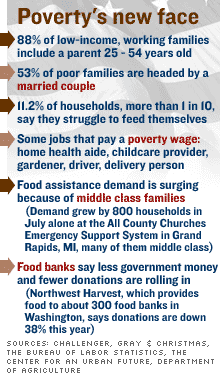NEW YORK (CNN/Money) -
Being poor doesn't mean being jobless, said a recent Challenger, Gray & Christmas report that found more and more working families are living at or below the poverty line.
"Poverty and hunger are rapidly becoming a workplace issue... if for no other reason than the fact that an employee who is worried about where his or her next meal will come from is not going to be very productive," said John Challenger, company CEO, in a statement.
But that's just the job placement firm's assessment. Aside from wage laws, there are no other rules telling businesses what they must give their employees.
"There is no mandate for corporations except for the minimum wage, which is set at $5.15 an hour. After that, the issue's up to the ethicists," said William Dickens, a labor economist with the Brookings Institution.
Several economists, labor activists and legal analysts also agreed that placing the welfare of American workers at the mercy of corporate largesse is dangerous for employees because of what Federal Reserve Chairman Alan Greenspan has dubbed Wall Street's "infectious greed."
However, some labor economists say altruism could hurt bottom lines, which eventually hurts workers. For example, if a company raises minimum pay, its costs could rise and leave it vulnerable to competitors who pay less.

"But like with anything, there is a low road and a high road," said Jared Bernstein, a labor economist at the EPI. "You can be profitable by squeezing your work force, offshoring and giving workers poor conditions, but it's not stable and it's time limited."
Bernstein said studies have shown that the "high road" -- which amounts to offering living wages that are usually higher than market wages, benefits and job security -- makes a more productive workforce and is as profitable as a firm run on poorly-treated, part-time labor paid so little they can't feed themselves.
"The bottom line is that it's better to run a workforce on security than insecurity," Bernstein said.
Regulatory holes
The problem of the working poor is also a problem of wealth distribution within a company, said Louis Malizia, assistant director of the International Brotherhood of Teamsters' Office of Corporate Affairs.

For example, the Economic Policy Institute, a Washington D.C. think tank, says only 15 percent of workers at the bottom fifth of the pay scale have pensions; while 71 percent of the top fifth of workers have pensions.
"That's the mindset we're trying to fight. The gap is much too large between executive and mainline worker pay," said Malizia.
"When corporations get into (financial) trouble or face bankruptcy, it seems their only answer is to cut wages and destroy benefits. Making workers forgo living wages and benefit security is an untenable way to guarantee quality service," added Malizia.
While Wall Street didn't boom in 2004, its largest companies posted steady earnings growth and improved balance sheets.
"That companies are making money and still can't pay a living wage seems obscene," said Karen Nussbaum, a director with the AFL-CIO. "(Corporations) will say they have to suppress wages to provide low-cost consumer products and services, but they don't tell you about the unbelievable profits they enjoy and the huge paychecks being reaped at the top."
Unions are one way for workers to protect themselves through collective bargaining, but they are losing strength as major companies like Wal-Mart openly discourage them.
"It will take among other things changes in government to make workers feel secure enough to exercise this right," Malizia said.
Government oversight
"The government should be actively enforcing the high road," the EPI's Bernstein said, but some economists and union leaders believe the current administration is not doing enough to protect workers, and may even be weakening their rights.
"We're seeing the natural consequences of unbridled corporate power to reduce wages and benefits," said Nussbaum. "That's why people are working two jobs and still cannot afford food."
EPI information shows that corporate taxes are at an historic low and that more and more large corporations are being accused of flagrantly violating overtime and workers' compensation laws.
Nussbaum said business pressure and government leniency have over the last 50 years dismantled laws enacted 100 years ago to protect workers from business interests.
YOUR E-MAIL ALERTS
|
Follow the news that matters to you. Create your own alert to be notified on topics you're interested in.
Or, visit Popular Alerts for suggestions.
|
|
|
 |
"We have to see this as part of a greater trend in corporate culture and force the government to do something about it, or soon workers will have nothing left," she added.
Consumer boycotts and shareholder pressure are another method being used to protect workers by directly pressuring companies to take the high road.
"A recent though still small trend is shareholder activism," said Brossman. "Churches, unions, benefit funds – several groups are introducing shareholder proposals that deal with social issues, pressuring the board to be a better company by saying that social responsibility is a form of profit, and one they believe is important."
"This is not a legal issue only," said Brossman. "It's a test of our society and evidence of what American values are."

|
